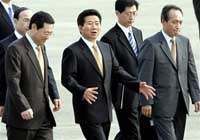High-level inter-Korean talks to end without agreement: SKorean official
High-level talks between the two Koreas will end without any agreement Friday, an official said, after the South refused to grant the North quick food aid unless it acts on a pledge to halt its nuclear weapons program.

"There will be no joint statement," a South Korean Unification Ministry official said through a pool reporter. The two sides agreed to hold a closing session later Friday, the official said asking for anonymity citing the issue's sensitivity.
The food aid had been considered to be a potential deal breaker in this week's Cabinet-level meetings in Seoul, after the South decided to delay shipment of the agreed-upon rice provision until after Pyongyang moves on its promise made during international arms talks to close its main nuclear reactor.
North Korea has bristled at the South's move, reportedly threatening to suspend family reunions with the South. The breakdown is expected to lead to a renewed chill in relations between the two Koreas.
Seoul had promised the rice would be delivered by late May. But the timetable was thrown into limbo after Pyongyang missed an April deadline to close the Yongbyon reactor and let in U.N. nuclear inspectors - part of a deal it made in exchange for energy and aid and political concessions.
South Korean officials have said that they made clear to the North while agreeing to the aid that its delivery would depend on progress in North Korea's nuclear disarmament.
President Roh Moo-hyun, in an interview with The Associated Press, said Seoul would continue to use aid as leverage to press the North to disarm. South Korea has drawn criticism at home and abroad over its "sunshine policy" of continued engagement even as Pyongyang holds onto its nuclear weapons.
"The fact that the Korean government is practicing the 'sunshine policy' toward North Korea does not mean that we forfeit all rights to take issue with North Korea's missile launches and nuclear test," Roh said Thursday. "Although we fully embrace the 'sunshine policy,' I believe that what has to be said, has to be said."
Outside the Seoul hotel where the talks were under way, about 10 anti-North Korea demonstrators staged brief protests, with one of them tearing up an image of North Korean leader Kim Jong Il.
"Repatriate abductees and prisoners of war!" shouted a female protester surrounded by riot police, referring to about 1,000 South Koreans believed to be held in the North after being taken prisoner during the 1950-53 Korean War or abducted later.
Police detained some of the protesters for questioning.
Meanwhile, a senior North Korean diplomat confirmed the North's intentions to shut the reactor down, but only after settling a dispute over frozen assets. At issue is North Korea's desire to reclaim funds from a Macau bank that was blacklisted by the U.S. in 2005.
"From the beginning, our position has been consistent" that the North will close the Yongbyon reactor only after receiving the US$25 million (euro18.6 million) being held in Banco Delta Asia, Kim Myong Gil, a minister at North Korea's mission to the U.N. in New York, told AP by telephone on Thursday. "There is no other way."
North Korea's money was freed earlier this year, but the North has not withdrawn it, apparently seeking to receive it through a bank wire transfer to prove the funds are now clean. The U.S. had alleged the funds were tied to money laundering and counterfeiting.
Subscribe to Pravda.Ru Telegram channel, Facebook, RSS!


